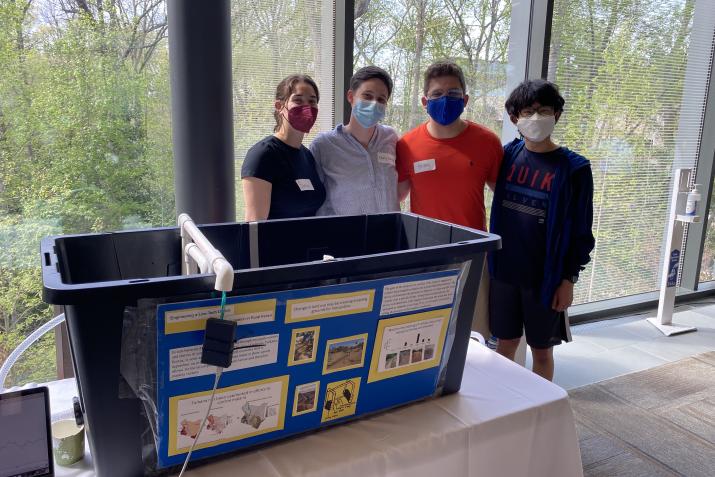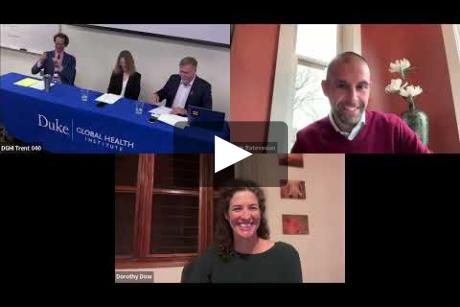
Members of a Bass Connections team stand near their project display during the program's fair in April 2022. The students' work focused on creating a low-cost device to monitor irrigation in rural Kenya.
Published October 5, 2023 under Education News
An effort to disrupt patterns of intimate partner violence in Kenya highlights the new global health related Bass Connections project teams for 2023-24.
Led by DGHI associate professor Eve Puffer, Ph.D., and doctoral scholar Savannah Johnson, the project is one of 10 Bass Connections teams addressing topics related to global health. Four of those projects are officially hosted by DGHI, and several others include global health faculty and students.
Part of Duke’s commitment to knowledge in service to society, the Bass Connections program funds interdisciplinary teams of faculty, graduate and undergraduate students to work on year-long projects addressing complex societal issues. DGHI faculty and staff have led dozens of teams during Bass Connections’ 10-year history, giving hundreds of Duke students real-world experience working with community partners to address health disparities around the globe.
“DGHI has a strong commitment to being engaged in interdisciplinary research and contributing to complex problem solving,” says Lysa MacKeen, DGHI’s assistant director for experiential learning and graduate admissions. “Working with Bass is a marvelous way to provide opportunities for students, but also for faculty and networking in that space.”
MacKeen says DGHI’s partnership with the program has been integral in shaping students’ research interests and skills. Students can join the program as early as their freshman year, and some have transitioned from team members to leaders on multi-year projects.
“The students get realistic experiences of how research works in communities and how those communities work with us,” she says. “They are more likely to have that interdisciplinary approach in their future studies.”
Many global health-related Bass projects grow out of long-standing collaborations with international partners. That is the case for the team led by Puffer and Johnson, who have been working for years on interventions to prevent intimate partner violence, which affects more than 44% of women in sub-Saharan Africa. The Bass team will study how drivers of violence form in adolescence and develop culturally tailored interventions to promote adolescent mental health and prevent future violence.
Another 2023-24 Bass project is seeking to translate promising interventions from one setting to another. Catherine Staton, M.D., an associate professor of emergency medicine, neurosurgery and global health, is leading a project that will adapt a phone app to aid healthcare workers in India in identifying alcohol-use disorders among patients. The app, which was developed by student teams, has been previously used in Tanzania and Brazil.
Other DGHI-hosted projects this year will focus on improving cancer control equity in China, building sustainable neurological systems in developing countries, and the role of physiotherapy in Ugandan neurosurgical transitional care.
What all those projects have in common is that they break the traditional mold of scientific research, where experts collaborate mostly with others who share their expertise. With Bass teams, experts from multiple fields work together to solve issues alongside students from different academic levels.
“It breaks silos,” MacKeen says. “These are complicated questions people are trying to solve.”
Bass Connections is currently accepting proposals for 2024-25 projects. Interested faculty should submit ideas by Nov. 6.


